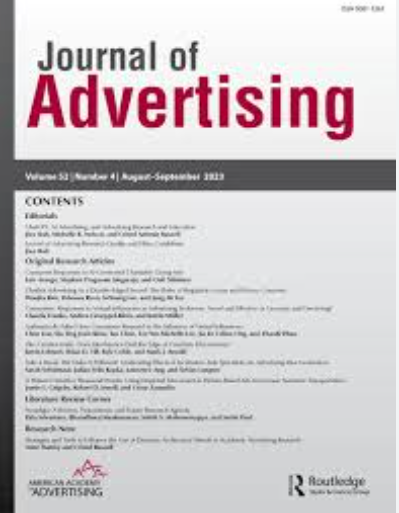Take a Break, But Make It Different! Moderating Effects of Incubation Task Specificity on Advertising Idea Generation
IF 7
2区 管理学
Q1 BUSINESS
引用次数: 0
Abstract
Abstract Experiments in psychology suggest that an incubation phase during idea generation can be beneficial. The incubation phase involves taking a break from thinking about the creative problem, usually by performing a distraction task. However, no studies test the influence of incubation phases in advertising tasks. In-depth interviews among 12 advertising creatives emphasize the practical relevance of this topic but also reveal a lack of knowledge regarding how to design effective breaks. Creating advertisements differs notably from tasks typically investigated in psychology (e.g., Unusual Uses Task). Whereas advertising idea generation requires a complex process of configuring individual elements into a coherent story, the latter requires selecting solutions from a pool of possible options. This research tests this new classification (configuration versus selection) and its implications. In two experiments, participants who engage in an incubation task that occupies brain areas similar to those used in the creative tasks do not exhibit enhanced creative performance compared with no incubation. However, those who engage in an incubation task that involves brain areas different from the creative task perform better. These outcomes reflect task-specific neural fatigue, suggesting that to gain the benefits of incubation phases, advertising creatives must engage specifically in break activities that are dissimilar from the creative task.休息一下,但要与众不同!孵化任务特异性对广告创意生成的调节作用
摘要心理学实验表明,在思想产生过程中的孵化阶段可能是有益的。孵化阶段包括暂停思考创造性问题,通常是通过执行分散注意力的任务。然而,没有研究测试孵化阶段对广告任务的影响。对12名广告创意人员的深入采访强调了这一主题的实际相关性,但也揭示了他们缺乏如何设计有效休息的知识。创建广告与心理学中通常调查的任务(例如,异常使用任务)有很大不同。广告创意的产生需要一个复杂的过程,将各个元素配置成一个连贯的故事,而后者需要从一系列可能的选项中选择解决方案。这项研究测试了这种新的分类(配置与选择)及其含义。在两个实验中,与没有孵化相比,参与孵化任务的参与者占据的大脑区域与创造性任务中使用的区域相似,但他们的创造性表现并没有增强。然而,那些参与与创造性任务不同的大脑区域的孵化任务的人表现更好。这些结果反映了特定任务的神经疲劳,表明为了获得孵化阶段的好处,广告创意人员必须专门从事与创意任务不同的休息活动。
本文章由计算机程序翻译,如有差异,请以英文原文为准。
求助全文
约1分钟内获得全文
求助全文
来源期刊

Journal of Advertising
Multiple-
CiteScore
11.20
自引率
10.50%
发文量
55
期刊介绍:
The Journal of Advertising is the premier journal devoted to the development of advertising theory and its relationship to practice. The major purpose of the Journal is to provide a public forum where ideas about advertising can be expressed. Research dealing with the economic, political, social, and environmental aspects of advertising, and methodological advances in advertising research represent some of the key foci of the Journal. Other topics of interest recently covered by the Journal include the assessment of advertising effectiveness, advertising ethics, and global issues surrounding advertising.
 求助内容:
求助内容: 应助结果提醒方式:
应助结果提醒方式:


